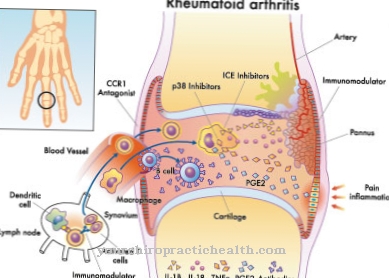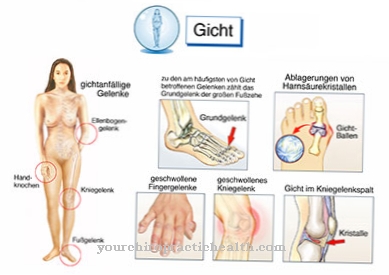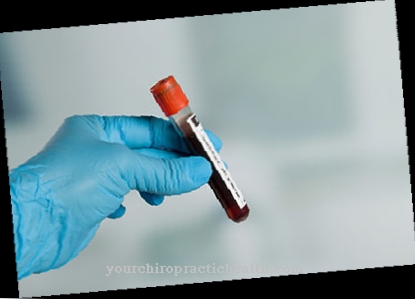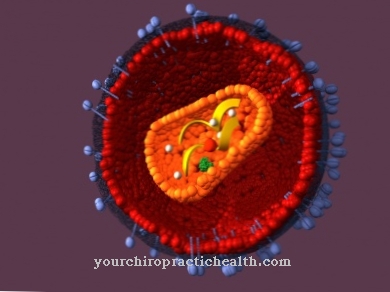The uncontrolled intake of medication can lead to severe kidney damage up to acute or chronic kidney failure in the case of substances with a strong nephrotoxic (kidney-damaging) effect. Depending on the extent of kidney damage caused by the medication taken, the disease can usually be treated well if therapy is started early.
What is kidney damage from medication?

© hywards - stock.adobe.com
Kidney damage from drugs or as a result of the ingestion of drugs that damage the kidneys belong to the spectrum of diseases of toxic nephropathy. Toxic nephropathy is a chronic or acute damage to the kidneys caused by noxae (pathogenic substances).
Kidney damage caused by medication usually manifests itself in acute kidney inflammation, which is caused by hypersensitivity reactions of the kidneys to the medication taken and is associated with allergy-typical symptoms such as joint and limb pain as well as rash and fever.
In addition, the urine fluid can have a bloody and cloudy discoloration, as proteins and red blood cells can no longer be filtered out as a result of the impairment of kidney function. In the further course, hypertension (increased blood pressure), increased urine concentration, edema (water retention) in the legs and arms, pale gray skin, insomnia, cardiac arrhythmias, nervousness as well as concentration disorders and bad breath (foeter uraemicus) are further symptoms of kidney damage from medication.
causes
Almost all drugs have nephrotoxic properties, especially if they are taken long-term and / or in high doses. For this reason, blood values and kidney function are regularly checked for a large number of medications.
Since the kidneys play a crucial role in detoxifying and breaking down pathogenic substances, drugs often put additional stress on the kidneys, which are also very well supplied with blood, and are therefore particularly exposed to the substances themselves and their breakdown products.
If the concentration of the medication rises above the water reabsorption rate in the blood, there is an increased concentration of these substances in the kidneys, which causes the characteristic damage to the kidney tissue.
In addition, the breakdown products of certain drugs are toxic substances that cause additional damage to the kidneys. In addition to painkillers, chemotherapeutics, substances that regulate blood pressure, diuretics, antibiotics, and rheumatism and gout drugs are among the drugs that can cause kidney damage.
Symptoms, ailments & signs
Medicines can promote a variety of kidney diseases or even cause kidney damage themselves. The possible symptoms of drug-induced kidney disorder include tiredness, fatigue, fatigue and a general feeling of illness. Typical physical symptoms are water retention and shortness of breath.
Due to the restricted kidney activity, urine excretion is also reduced, which can result in fever and urinary tract infections. Cardiovascular problems such as a drop in blood pressure, palpitations and cardiac arrhythmias can also occur. Externally, kidney disease can be recognized by paleness and a generally sickly appearance.
Hair loss can also occur. Some people have tremors or even convulsions. The exact symptom picture is based on the triggering drug and the type of kidney damage. What kidney damage has in common is that it greatly reduces the patient's quality of life and well-being.
Typically, severe pain and a variety of other complaints occur, which get worse as the disease progresses. If the offending drug is not stopped, kidney failure eventually occurs and the patient dies. By switching to a harmless preparation, the occurrence of further symptoms can be prevented. Depending on whether permanent damage has already occurred, a full recovery may also be possible.
Diagnosis & course
Based on the symptoms currently present, initial indications of a Kidney damage from drugs be diagnosed. The diagnosis can be confirmed by a blood and urine analysis, which allows conclusions to be drawn about kidney function and existing restrictions.
If there is damage to the kidneys or impairment of kidney function, the concentration of urinary substances (creatinine, urea) in the blood and urine is increased. In addition, further examinations such as quantitative and qualitative functional tests to determine the extent of renal insufficiency (kidney weakness) are indicated.
With the help of imaging methods (sonography, computer tomography, magnetic resonance tomography, scintigraphy), a morphological assessment of the kidneys and the urinary tract can be performed. The course and prognosis of kidney damage caused by medication depend largely on the extent of the impairment present.
While acute kidney damage can usually be treated well by discontinuing medication, pronounced impairment of the kidneys after long-term use of nephrotoxic medication is often irreversible.
Complications
Both the blood purification and the salt and water balance of the body are disturbed due to the damaged kidney. Various organs are thus restricted in their function. As a result, various health-endangering complications can arise despite treatment.
As the body produces less urine, excess water and salts can no longer be adequately excreted. Therefore the blood pressure rises. Due to the decreased urine output, the body stores fluid. Edema develops. Primarily there is fluid retention in the legs. Edema can develop in any part of the body. In the worst case, there is fluid retention in the lungs (pulmonary edema).
Pulmonary edema manifests itself as white and foamy cough secretion and can lead to severe shortness of breath. Since the cardiovascular system is damaged, pronounced calcifications occur in the arteries and heart valves. The development of heart valve defects and cardiac insufficiency is thus promoted. The calcified arteries can also cause a heart attack or a stroke.
As the kidneys increasingly lose their ability to excrete potassium, this can lead to increased levels of potassium in the blood (hyperkalemia). Indicators of an increased potassium level are a slow heartbeat, dizziness, brief loss of consciousness, muscle weakness and tingling sensations. Heavily increased potassium levels can lead to cardiac arrhythmias and cardiac arrest.
The excess water that accompanies high potassium levels can also trigger a stroke or heart attack. Frequent complications are also neurological disorders. Such disorders of the nervous system manifest themselves through tiredness, memory, concentration, perception and sleep disorders, muscle weakness, itching and disorientation. Due to the weakening kidney function, the body only produces small amounts of blood-forming hormones.
Therefore the development of anemia is favored (anemia). This can manifest itself in decreased physical resilience, tiredness and paleness of the skin. In addition, declining kidney function is accompanied by disorders of bone metabolism. For this reason, fractures, bone, muscle and joint pain occur more frequently.
The damaged kidney causes the phosphate level in the blood to rise. High phosphate levels cause itching, bone and muscle pain. The increased values also intensify the risk of heart attack and stroke. Since the body absorbs less protein as the kidney function declines, the patient may also suffer from malnutrition.
When should you go to the doctor?
Kidney damage from medication is always a case for the doctor. The earlier the damage to the kidneys is noticed, the more treatable it is, depending on the type of drug, dose and duration of use. At best, kidney damage recognized early can completely regress through medication - a prerequisite for this is that the person concerned see a doctor as quickly as possible and not delay the necessary doctor's appointment. If the harmful drug is taken on the doctor's prescription, the regular check-ups must be strictly observed, as the doctor can also check kidney values and notice if the kidneys have been damaged.
If the patient takes a drug that can damage the kidneys without a doctor's recommendation, he must read the information on the package insert before taking it and watch out for possible symptoms of kidney damage while taking it. If these occur, it is advisable to consult a doctor even if they are not perceived as severe or stressful or if they improve on their own in phases. Only the doctor can tell whether they are harmless or whether kidney damage has actually occurred due to medication - therefore, possible symptoms should always be taken seriously while taking medication.
Treatment & Therapy
The therapeutic measures are attached Kidney damage from drugs largely on the extent of the specific damage and on whether there is an acute or chronic impairment of the kidneys.
In the case of acute kidney damage, the medication causing the problem is often discontinued as a first step. In some cases, hemodialysis is also performed, through which the kidney function is temporarily replaced until the kidneys normalize and the excess urinary substances and electrolytes are filtered from the blood of the person concerned.
Hemodialysis also helps to stabilize the circulation and promotes blood flow to the kidneys. Renal function values should be checked regularly during therapy and, if the patient worsens, the treatment should be adjusted accordingly. In addition, dietary measures such as a diet low in salt, protein, phosphate and potassium are recommended to support the treatment of kidney damage.
Furthermore, the daily amount of fluid should be adjusted to the current performance of the kidneys. If anemia (anemia) is diagnosed, the hormone erythropoietin, which is normally produced in healthy kidneys, is used, which stimulates the synthesis of red blood cells in the bone marrow.
In the more advanced stage of the disease with irreversible damage to the kidneys as a result of taking medication, permanent dialysis or possibly a kidney transplant may be necessary.
Outlook & forecast
Kidney damage from medication leads to permanent damage to the organ. The tissue is irreparably damaged and thus affects the functioning of the kidneys. A recovery is not achieved in these patients because the self-healing powers of the human organism do not allow regeneration of organic tissues.
There is a need for long-term therapy in which medically controlled medication is administered in order to alleviate the health problems. The aim is to improve the overall situation and avoid an increase in existing complaints. Some people may need dialysis due to the severity of the disease. This is often the only way to reduce existing complaints.
The necessary treatment methods for kidney damage have a strong impact on everyday life. The physical and emotional stress is immense for many people due to the therapies required. There is therefore an increased risk of developing secondary diseases in these patients and a marked reduction in general well-being. This fact must be taken into account when making the overall forecast.
If the kidney damage from the medication taken is very severe, a donor organ may be necessary to avert a possible danger to life. There are numerous complications associated with transplantation that need to be considered.
prevention
The most effective measure to Kidney damage from drugs Prevention is the careful and careful handling of these potentially nephrotoxic substances. Medicines that should be taken with particular caution include pain relievers such as paracetamol, non-steroidal anti-inflammatory drugs (acetylsalicylic acid) and ibuprofen.
Aftercare
Follow-up examinations and, if necessary, follow-up treatments are necessary for kidney damage caused by medication. Depending on the damage, outpatient follow-up care by a nephrologist is advisable. This is also the case when the kidney function is largely restored after treatment of the kidney damage has been completed.
This will limit the risk that can develop as a result of damage to the kidneys. Appropriate treatment approaches are possible through early detection as part of this aftercare. Symptoms that indicate kidney disease or urinary tract disease are diagnosed promptly. Diagnostic and therapeutic measures can avoid complicated, acute kidney damage with early detection.
Annual check-ups are recommended. In this context, the family doctor carries out examinations on the patient. In addition to determining the urine status, blood count tests are carried out. The patient should also see a urologist at least once a year. If normal kidney function is confirmed in the course of the follow-up, the intervals between the examinations will be extended by the attending physician.
Follow-up care for the patient includes a generally healthy lifestyle with a balanced diet, sufficient drinking and sporting activities. If the kidney damage caused by medication is very advanced and very severe, temporary or permanent dialysis treatments are also necessary after medical follow-up clarification.
You can do that yourself
People who have suffered kidney damage from medication should consult their doctor to clarify the side effects of any medication they are prescribed.In addition, the package insert must be read carefully. If you have any questions or are unclear, the pharmacist can also provide missing information. Depending on the kidney damage present, an individual therapy plan is worked out to which the affected person should adhere. Adequate fluids should be consumed and heavy physical activity should be avoided. As soon as irregularities are noticed through overexertion, rest and protection are necessary.
A good and restful night's sleep is important for maintaining well-being. Sleep hygiene must be optimized and disruptive factors eliminated. The diet should be adapted to the needs of the organism. The supply of sufficient vitamins, trace elements and nutrients is necessary to stabilize the immune system. Pollutants such as nicotine, alcohol or drugs are to be avoided as a matter of principle. They worsen the general state of health and can contribute to further impairment of the quality of life.
Despite the kidney damage, regular light exercise and daily outdoor activities are recommended. Yoga or meditation help to build up inner strength and contribute to a harmonization of the emotional state. Overall, this leads to an increase in wellbeing.



.jpg)


.jpg)

















.jpg)



